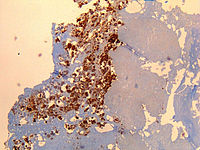
Photo from wikipedia
Early detection of and treatment for chronic Q fever might prevent potentially life-threatening complications. We performed a chronic Q fever screening program in general practitioner practices in the Netherlands 10… Click to show full abstract
Early detection of and treatment for chronic Q fever might prevent potentially life-threatening complications. We performed a chronic Q fever screening program in general practitioner practices in the Netherlands 10 years after a large Q fever outbreak. Thirteen general practitioner practices located in outbreak areas selected 3,419 patients who had specific underlying medical conditions, of whom 1,642 (48%) participated. Immunofluorescence assay of serum showed that 289 (18%) of 1,642 participants had a previous Coxiella burnetii infection (IgG II titer >1:64), and 9 patients were suspected of having chronic Q fever (IgG I y titer >1:512). After medical evaluation, 4 of those patients received a chronic Q fever diagnosis. The cost of screening was higher than estimated earlier, but the program was still cost-effective in certain high risk groups. Years after a large Q fever outbreak, targeted screening still detected patients with chronic Q fever and is estimated to be cost-effective.
Journal Title: Emerging Infectious Diseases
Year Published: 2022
Link to full text (if available)
Share on Social Media: Sign Up to like & get
recommendations!